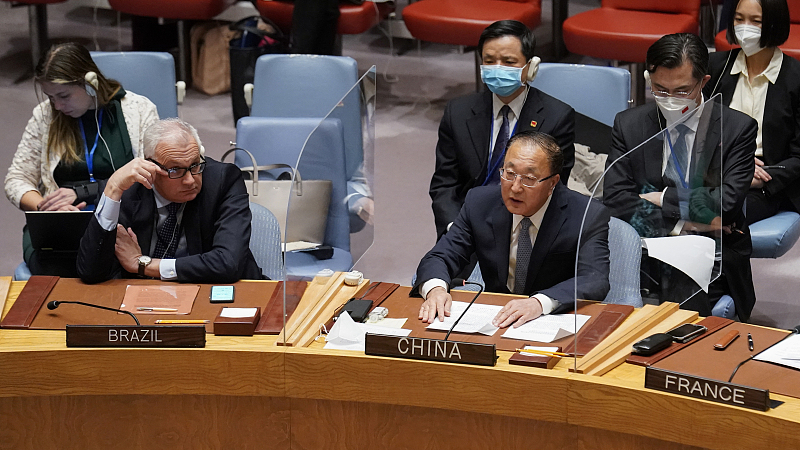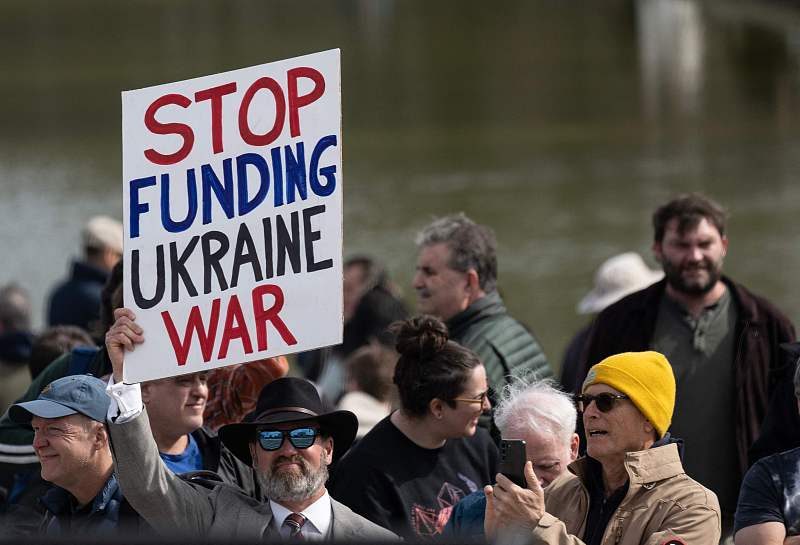
Zhang Jun, Permanent Representative of China to the United Nations, speaks during a meeting of the UN Security Council at United Nations headquarters, March 23, 2022. /CFP
Zhang Jun, Permanent Representative of China to the United Nations, speaks during a meeting of the UN Security Council at United Nations headquarters, March 23, 2022. /CFP
Editor's note: Azhar Azam works in a private organization as "Market & Business Analyst" and writes on geopolitical issues and regional conflicts. The article reflects the author's opinions and not necessarily the views of CGTN.
Since the onset of the Ukraine crisis, China has taken a neutral stance and called for a diplomatic solution. Nevertheless, U.S. Secretary of State Anthony Blinken in Munich accused Chinese companies of supplying non-lethal support to Russia, claiming Beijing "will provide lethal material" to the Kremlin.
Eventhough, Blinken and other American officials have denied seeing any evidence, the U.S. is dragging China into the conflict. The U.S. Treasury Department in January sanctioned a Chinese technology firm for allegedly providing satellite imagery to Wagner operations in Ukraine.
The U.S. actions have been exacerbated by a biased media and think tank reports that had smeared several Chinese entities for exporting military and dual-use technology items to Russian defense companies. Washington is undermining China's legitimate rights and interests. The Ukraine crisis had placed China "in a very difficult position," since Beijing had earlier maintained good ties with both warring parties.
Inevitably, wars disrupt the peace, economy and trade between countries. China's peaceful development has boosted the international economy, while ushering in stability across regions by emphasizing economic cooperation. A stable and flourishing Europe is in China's interests and Beijing stands keen to see an end to the Ukraine conflict.
Apparently by supplying lethal weapons to Kyiv, the U.S. is prolonging the conflict, as well as profiteering from the arms sales and energy crisis in Europe. Any considerations to deliver fighter jets, missile and other lethal munitions to Ukraine or sanctions and confiscation of Russia assets will only draw out the conflict for much longer.
Meanwhile, Brussels and Washington have several policy and issues' differences over China. The EU bloc is wary that Washington is pushing a new "cold war" against Beijing, although China is a major economy. This would pose significant threats to the closer EU-U.S. "policy alignment," vis-a-vis China and may test transatlantic ties.
The revival of the infamous Cold War grouping, the Committee on the Present Danger – which overstated the Soviet threat and was unveiled by a group of U.S. policy advisers and former officials including Steve Bannon in March 2019 – aims to stoke public sentiments against China and to increase war spending.
Beijing's characterization as a challenge to the self-styled Western values, security and interests by the U.S.-led NATO's Secretary General Jens Stoltenberg is a cold war desire. This brings about downside risks to global peace and stability, especially the Asia-Pacific. Stoltenberg said, "weapons are the way to peace" and describes the Ukraine war as a "fight for democracy," while NATO is confronting Beijing on arms control and reshaping it into a more aggressive organization.
Stoltenberg claimed to have found "some signs" of China's alleged support to Russia in Ukraine and said Beijing shouldn't "in any way support violation of the UN Charter or international law." Yet, NATO has served as a tool for the U.S. to support invasions of sovereign countries, while calling for the United Nations to expel member states that disagree with the U.S. foreign policy agenda.

Demonstrators gather during an anticonflict rally to mark the one-year anniversary of the conflict in Ukraine at the Lincoln Memorial in Washington, D.C., February 19, 2023. /CFP
Demonstrators gather during an anticonflict rally to mark the one-year anniversary of the conflict in Ukraine at the Lincoln Memorial in Washington, D.C., February 19, 2023. /CFP
Meanwhile, Beijing favors respecting international law, the UN Charter and territorial integrity of all countries, while advocating for peace negotiations. One year after the Russia-Ukraine conflict erupted, Europeans feel divided over arming Kyiv and hope diplomacy can end the conflict. A consensus is growing worldwide that countries "cannot afford to lend (more) financial assistance to Ukraine."
Polls suggest that inflation, poverty and inequality and unemployment are the top issues for the global public; a majority of Europeans and Americans believe their countries are heading in the wrong direction. Americans are losing interest in wars and foreign conflicts, while the domestic economy, jobs, crime and corruption are their major concerns.
Beijing isn't the only country that has stayed impartial over the Ukrainian conflict. Many countries in the Global South, from Asia and Middle East to Latin America, have taken neutrality to heart. Washington is dividing the world into blocs, firing up alliances and projecting power. However, the U.S. has not rallied deeper support from the global who see the future of the world in multipolar terms.
China and EU are comprehensive strategic partners as the latter considers the former has become Brussels' strategic development partner. The commitment has ensured "continued progress" in global sustainable development over common interests, such as climate change, trade and investment, as well as increasing engagement over the Ukraine crisis through joint political and diplomatic contributions.
(If you want to contribute and have specific expertise, please contact us at opinions@cgtn.com. Follow @thouse_opinions on Twitter to discover the latest commentaries in the CGTN Opinion Section.)